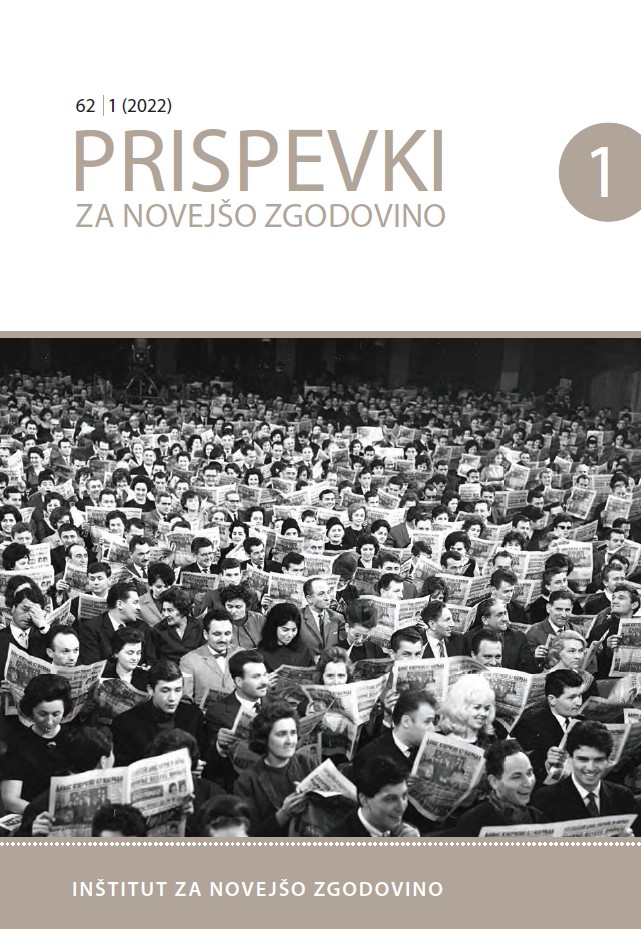The Journalist's Action in Socialist Yugoslavia
Understanding the Formulation "the Journalist as a Socio-political worker"
DOI:
https://doi.org/10.51663/pnz.62.1.4Keywords:
journalist, socio-political worker, socialism, self-management, YugoslaviaAbstract
In this paper, we analyse the language game “the journalist as a socio-political worker”, which was the professional label for journalists’ action in the former socialist Yugoslavia. The text is divided into two main parts. The first part uses a historical-conceptual method to analyse the mentioned formulation in normative texts, covering programmatic and engaged texts produced at the time. This approach seeks to enter into the meaning of the term from the inside, into the pulse and spirit of the time, and above all to understand what its creators wished to achieve and communicate with this expression. We find that journalism and the journalist’s action as a socio-political worker were understood as an important political factor, as a political force on one hand contributing to the development and implementation of a new socio-political order, i.e., a socialist community based on self-management and, on the other hand, the journalist who through their own products tried to influence the broader consciousness of the masses, as manifested through the idea of the education for the new man: the self-manager. The second part of the paper complements the first since through the qualitative method of in-depth semi-structured interviews with former journalists who had been professionally active in the Socialist Federal Republic of Yugoslavia, and via their recollections, we continue to internally reconstruct the meaning, understanding and use of the formulation at that time. In particular, we observe the relationship with politics that the concept essentially contains. Empirical analysis thus led us to different conclusions: some interviewees (the minority) described the term affirmatively, that the journalist as a socio-political worker had a special mission, while most approached the use and meaning of the expression with a critical distance, namely, that the journalist as a socio-political worker was harnessed to the needs of daily politics and thereby seen as non-autonomous in their labour and actions.
References
Agamben, Giorgio. Homo sacer: suverena oblast in golo življenje. Ljubljana: Študentska založba, 2004.
Aristotel. Nikomahova etika. Ljubljana: Slovenska matica, 2002.
Aristotel. Politika. Ljubljana: GV, 2010.
Arendt, Hannah. O revoluciji. Ljubljana: Krtina, 2017.
Arendt, Hannah. Predavanja o Kantovi politični filozofiji. Ljubljana: KUD Apokalipsa, 2018.
Arendt, Hannah. Vita activa. Ljubljana: Krtina, 1996.
Integralno besedilo ustave Socialistične federativne republike Jugoslavije in amandmajev I do XLVIII k ustavi Socialistične federativne republike Jugoslavije. Ljubljana: Uradni list SR Slovenije, 1989.
Fischbach, Franck. “Delo in možnost demokratičnega javnega prostora.” Filozofski vestnik XXXIV, No. 3 (2013): 23–33.
Fischbach, Franck. Kaj je socialistična vlada? Kar je živo in kar je mrtvo v socializmu. Ljubljana: Krtina, 2019.
Gorjup, Mitja. Samoupravno novinarstvo. Ljubljana: Delavska enotnost, 1978.
Kardelj, Edvard. Smeri razvoja političnega sistema socialističnega samoupravljanja. Ljubljana: ČZP Komunist, 1977.
Kirn, Gal. “Jugoslovanska revolucija skozi tri partizanske prelome.” Časopis za kritiko znanosti 45, No. 269 (2017): 316–32.
Koselleck, Reinhart. Pretekla prihodnost: prispevek k semantiki zgodovinskih časov. Ljubljana: Studia humanitatis, 1999.
Kvale, Steiner. Doing Interviews. London: Sage, 2007.
Merljak Zdovc, Sonja and Melita Poler Kovačič. “The Paradox of Slovenia: Investigative Journalism during Socialism and Democracy.” Journalism 8, No. 5 (2007): 522–29.
Močnik, Rastko. “V boju za svobodo javne besede – danes.” [foreword] In: Cenzura in svoboda tiska, Karl Marx and Friedrich Engels, 7–22. Ljubljana: Univerzitetna konferenca ZSMS: Republiška konferenca ZSMS, 1984.
Nežmah, Bernard. Časopisna zgodovina novinarstva. Ljubljana: Študentska založba, 2012.
Novinarstvo I, No. 2 (1965): 204–05. “Kodeks novinara Jugoslavije.”
Novinarstvo IX, No. 1-2 (1973): 98–102. “Kodeks novinara Jugoslavije.”
Novinarstvo XVIII, No. 3-4 (1982): 136–40. “Kodeks novinara Jugoslavije.”
Novinarstvo XXIV, No. 3-4 (1988): 82–83. “Kodeks novinara Jugoslavije.”
Peruško, Zrinjka, Dina Vozab and Antonija Čuvalo. Comparing Post-Socialist Media Systems: The Case of Southeast Europe. Oxon, New York: Routledge, 2021.
Poler, Melita. “Ethics and Professionalisation of Slovene Journalism.” Javnost (The Public) 3, No. 4 (1996): 107–21.
Ragin, Charles C. Družboslovno raziskovanje: enotnost in raznolikost metode. Ljubljana: Fakulteta za družbene vede, 2007.
Samary, Catherine. Komunizem v gibanju: zgodovinskih pomen jugoslovanskega samoupravljanja. Ljubljana: /*cf, 2017.
Scholtz, Gunter. “Kaj je pojmovna zgodovina in čemu se z njo ukvarjamo?.” Phainomena 11, No. 41/42 (2002): 137–58.
Vobič, Igor. “Three Paradigms of Journalistic Objectivity in Slovenian Press History.” Central European Journal of Communication 7, No. 1 (2014): 4–17.
Vozab, Dina and Dunja Majstorović. “The Transformation of Normative Approaches to Journalism in Croatian Academic Literature from Socialism to Post-Socialism.” Croatian Political Science Review 58, no. 2 (2021): 7–32.
Wittgenstein, Ludwig. Philosophical Investigations. Oxford: Basil Blackwell, 1963.
Zakon o združenem delu (1976). Ljubljana: Gospodarska založba, 1976.
Published
Issue
Section
License
Authors who publish with this journal agree to the following terms:
- Authors retain copyright and grant the journal right of first publication with the work simultaneously licensed under a Creative Commons Attribution License that allows others to share the work with an acknowledgement of the work's authorship and initial publication in this journal.
- Authors are able to enter into separate, additional contractual arrangements for the non-exclusive distribution of the journal's published version of the work (e.g., post it to an institutional repository or publish it in a book), with an acknowledgement of its initial publication in this journal.
- Authors are permitted and encouraged to post their work online (e.g., in institutional repositories or on their website) prior to and during the submission process, as it can lead to productive exchanges, as well as earlier and greater citation of published work (See The Effect of Open Access).
Funding data
-
Javna Agencija za Raziskovalno Dejavnost RS
Grant numbers J5-1793


